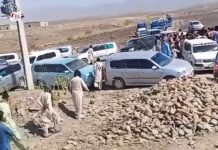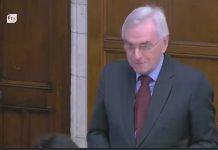Pakistani Prime Minister Imran Khan on Wednesday appointed Nawabzada Shahzain Bugti, grandson of renowned Baloch leader late Nawab Akbar Khan Bugti, as Special Assistant to the Prime Minister on Reconciliation and Harmony in Balochistan. Bugti is considered of leading the way towards a political reconciliation between the Baloch “pro-independence” groups and the government of Pakistan.
Bugti’s appointment came two days after the Pakistani premier said during his one-day visit to Gwadar that he is considering talking to “disgruntled” Baloch leaders. He blamed the previous governments for failing to give attention to the situation in Balochistan and accused India of “funding terrorism” in Balochistan.
Pakistan’s army chief — considered by many as the supreme leader of the country — echoed similar sentiments, saying that the stability of Balochistan is tied to the peace in Pakistan.
A part of the plan came to light a day later when the Cabinet Division of Pakistan issued a statement, appointing Shahzain Bugti — president of the Jamhoori Watan Party and Member of Pakistan’s National Assembly — as special assistant for political reconciliation. Bugti has been promoted to the status of a federal minister.
Baloch insurgent leaders responded to Imran Khan’s offers of negotiation, unanimously saying that until the independence of Balochistan is secured and the Pakistani military and security forces pulled out of the Baloch land, there will be no peaceful settlement. If the Pakistani authorities are acquiescent to our demands, then we are ready for negotiations brokered by a neutral international mediator, they said.
Experts argue that political reconciliation in Pakistan is unachievable without the support of Pakistan’s mighty military — who “pull the strings behind the veils” — and the Chinese authorities, who are now a key stakeholder in Balochistan owing to the China-Pakistan Economic Corridor. The military, however, has a key stake in the continuity of the conflict, as they mooch out prodigal funding from the government to counter the insurgency.
One analyst told The Balochistan Post that if the Pakistani government is sincerely considering negotiations with Baloch insurgent leaders, it has to stop playing the “India card.” He said that the Pakistani state has been continuously blaming its regional archrival for financing the protracted conflict in Balochistan. The truth is that the insurgency is a product of Pakistan’s policy failures in the region. Pakistani authorities need to be more realistic in their approach towards a political settlement, and acknowledging their responsibility in the conflict is one step towards that end, he argued.
Another expert argued that blaming India for the Baloch insurgency has another setback. Baloch “pro-independence” leaders are motivated to pick arms primarily due to their patriotism for Balochistan, and their determination to secure its independence. By portraying these leaders as the pawns of an outside aggressor — India — the Pakistani authorities are vilifying their legitimate struggle. “This attitude will only aggravate the problem; Pakistan needs to acknowledge that the conflict in Balochistan is of its own making.”
Baloch insurgent leaders have frequently clarified that the moment they pick up arms, they devote their lives to the independence of Balochistan. And until that goal has not been achieved, there will be no reconciliation with the Pakistani government. They are unshakable in their will for a sovereign, independent Balochistan, a demand that is impossible for the Pakistani authorities to accept.





























